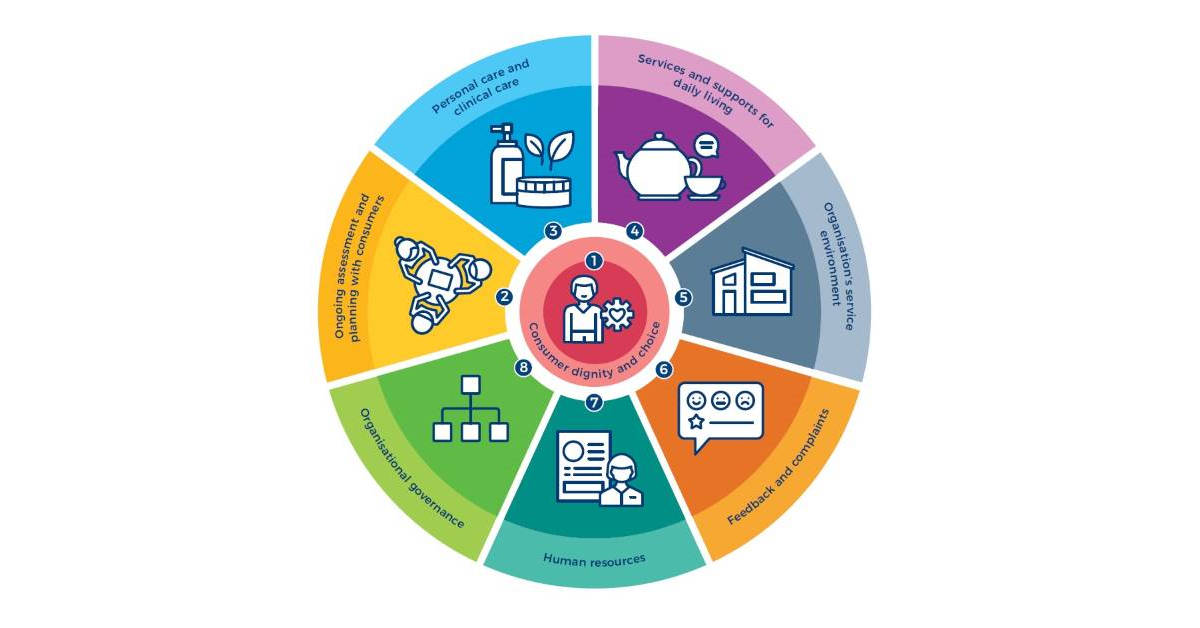The aged care quality standards are principles which outline consumer expectations in aged care. Aged care services are assessed by the Aged Care Quality and Safety Commission for compliance with these standards, in accordance with a range of legislation. In this article, we’ll outline what each of the aged care quality standards are designed to do, how they support consumers’ health and independence, and where you can find useful guidance and resources. Note that there will be
Strengthened Quality standards in place from 1 November, 2025.
What are the eight aged care quality standards?
The eight aged care quality standards focus on outcomes for consumers, and outline the standards of care that consumers should expect when using Australian Government subsidised aged care services. These new aged care quality standards focus on outcomes for consumers, with each quality standard expressed in three ways as:
- A statement of outcome for the consumer
- A statement of expectation for the organisation
- Organisational requirements to demonstrate that the standard has been met
These eight new standards have replaced the previous nine standards that were expressed across three categories: accreditation standards, home care standards, and National Aboriginal and Torres Strait Islander Flexible Aged Care Program Quality Standards. The eight new standards ensure that consumers receive quality aged care through:
- Consumer dignity and choice
- Ongoing assessment and planning with consumers
- Personal and clinical care
- Services and supports for daily living
- Organisation’s service environment
- Feedback and complaints
- Human resources
- Organisational governance
Consumer dignity and choice
The aged care quality standard of consumer dignity and choice ensures that consumers are treated as independent and with respect, allowing them to make informed choices about their care and services. This ensures that consumers can maintain their identity, with their culture, values, and diversity respected. The organisation must have a culture of inclusion and respect for consumers, support consumers in exercising their independence, and respect their consumer's privacy. Organisations must support consumers in taking risks which enable them to live the best life they can. They must also ensure that any information they provide to the consumer is current, accurate, timely, and communicated clearly.
Ongoing assessment and planning with consumers
The aged care quality standard of ongoing assessment and planning with consumers ensures that a consumer’s care and services are continually assessed, rather than simply started without any enduring planning and monitoring. This standard guarantees that any risks to a consumer’s health inform the safe delivery of effective care and services with the consumer’s needs, goals, and preferences addressed. This standard places strict planning requirements on aged care service providers to ensure that they work in partnership with the consumer to optimise their health and well-being in accordance with their needs, goals, and preferences. The outcomes of assessment must be clearly communicated to the consumer, documented, and reviewed for effectiveness regularly and when the consumer’s needs, goals, or preferences change. At Trilogy Care, we assign each consumer a
dedicated care manager who will work with the consumer to continually update their care plan to best meet there needs.
Personal care and clinical care
The aged care quality standard of personal care and clinical care ensures that these types of care are delivered in a safe and effective manner. Any high-impact or high-prevalence risks associated with the consumer must be effectively managed, with the needs, goals, and preferences of consumers nearing the end of life recognised and addressed to maximise their dignity and comfort. Any change in the consumers mental health, cognitive or physical function, capacity or condition must be recognised and responded to in a timely manner. The consumer’s condition must be documented and shared with other relevant care providers. Additionally, infection related risks must be minimised.
Services and supports for daily living
This aged care quality standard ensures that a consumer’s services and supports are important to their health and well-being, enabling them to do the things they want to in their daily living. Services must support and promote a consumer’s emotional, spiritual, and psychological well-being, and must optimise their independence, health, well-being and quality of life. Services which provide meals must ensure that they are varied and of suitable quality and quantity. Additionally, care equipment that is provided to the consumer must be safe, suitable, clean, and well maintained. Trilogy Care offers a
wide range of different services that can help you remain healthy, happy, and independent at home.
Organisation's service environment
This aged care quality standard safeguards consumers to ensure that they feel safe and comfortable within the organisation’s service environment. Consumers must feel like they belong, with their independence, function, and enjoyment promoted by the service provider. The service environment must be easy to understand and optimise a consumer’s sense of belonging, independence, interaction, and function. Additionally, any furniture, fittings, and equipment within the service environment must be safe, clean, well maintained and suitable for the consumer.
Feedback and complaints
The aged care quality standard of feedback and complaints outlines that consumers must feel safe and encouraged to give
feedback and make complaints. They must be supported through this process, with appropriate action taken with an open disclosure process which resolves these complaints. These complaints and feedback must be reviewed to improve the quality of aged care services. The feedback and complaints system must be accessible, confidential, prompt, and fair. A consumer’s support members, such as family, friends, or carers, must also be encouraged and supported to provide feedback and make complaints. Consumers must be clearly made aware of their access to advocates and language services which can assist them in making complaints. At Trilogy Care, we encourage complaints as they imporve the quality of the services that we provide to consumers. Simply fill out and submit
our feedback form, highlighting the details of the issue, and whether you would like a response. We've created a
video guide for submitting feedback to help you along the way. Alternatively, you can provide your feedback over the phone by calling us on 1300 459 190 .
Human resources
This aged care quality standard ensures that a consumer’s care and services are from those who are knowledgeable, capable, and caring. An organisation must use a skilled and qualified workforce that delivers safe, respectful, and quality care services. This standard ensures that a provider’s workforce has been correctly recruited, trained, equipped and supported to deliver quality care which meets these standards, and that the performance of each member of the workforce is continually assessed, monitored, and reviewed.
Organisational governance
The aged care quality standard of organisational governance certifies that a consumer must feel confident that a provider is well run, and that they are engaged and supported in the development, delivery, and evaluation of care services. Organisations must promote a safe and inclusive care culture with effective governance, risk management, and practices. Additionally, a clinical governance framework must be used where clinical care is provided.
What happens if the aged care quality standards are not met?
If these aged care quality standards are not met, the organisation responsible will be given a report of non-compliance. The Commission will then determine if the non-compliance ‘places safety, health or well-being of aged care consumers at serious risk’. The non-compliant provider will be notified, and may be given a chance to respond to and address the issue. The commission will create a timetable for improvement, which outlines the steps the provider must take to fix their non-compliance. The commission will make an assessment on whether these improvements have been made at a later date, and make sanctions and take other necessary measures if required.
Where can I find the outcome of reports?
You can find if a particular provider has had any issues with non-compliance through My Aged Care’s find a provider tool. You can also search for non-compliance within a specific location, organisation name, or date range using My Aged Care’s non-compliance checker. Non-compliance reports can also be found through My Aged Care’s find a report tool.
How do I report that the aged care quality standards are not met?
If you want to
give feedback regarding aged care quality standards that have not been met, your first point of contact should be with your service provider. Complaints are taken seriously and are encouraged as they improve a provider’s quality of services. If you would like to submit a complaint to Trilogy Care, simply fill out and submit
our feedback form, highlighting the details of the issue, and whether you would like a response. We've created a
video guide for submitting feedback to help you along the way. Alternatively, you can provide your feedback over the phone by calling us on 1300 459 190 . If you don’t feel comfortable raising your feedback with your provider, you can contact Aged Care Quality on 1800 951 822, or email
[email protected] . Alternatively, you can submit a formal complaint through the Commission’s online complaint form.
Where can I find more guidance and resources on aged care quality standards?
You can find additional guidance and resources on the aged care quality standards through the Aged Care Quality website. You will find helpful resources on the aged care quality standards such as the quality standards factsheet,
explainer video, and outcome statements poster. If you’re not happy with the service you are receiving from your current provider and are looking to switch, you’ll love our guide on
the steps to switch providers. If you need help with choosing a new provider, make sure you know
which questions to ask when choosing a provider.

